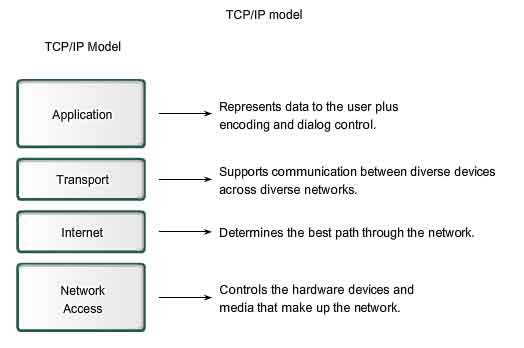What is TCP/IP Reference Model?
|
TCP/IP means transmission control protocol and internet protocol. Protocols are set of rules which govern every possible communication over the internet. These protocols describe the movement of data between the host computers or internet. These offer simple naming and addressing schemes.

What is TCP/IP Reference Model?
|
Layer 1: Host-to-network Layer
- The lowest layer of them all.
- The protocol is used to connect the host so that the packets can be sent over it.
- Varies host to host and network to network.
Layer 2: Internet Layer
- Selection of a packet switching network which is based on a connectionless internetwork layer is called an internet layer.
- It the layer which holds the whole architecture together.
- It allows the host to insert the packets.
- It helps the packet to travel independently to the destination.
- Order in which packets are received is different from the way they are sent.
- IP (internet protocol) is used in this layer.
Layer 3: Transport Layer
- It decides if data transmission should be on a parallel path or single path.
- Functions such as multiplexing, segmenting or splitting into the data done by layer four that is transport layer.
- Transport layer breaks the message (data) into small units so that they are handled more efficiently by the network layer.
- Functions of the transport layer are same as the OSI model.
- The transport layer also arranges the packets sent in sequence.
Layer 4: Application Layer
- Protocols used in this layer are high-level protocols such as TELNET, FTP (file transfer protocol etc.
The advantage of TCP/IP model
|
- It operated independently.
- It is scalable.
- Client/server architecture.
- Supports a number of routing protocols.
- Can be used to establish a connection between two computers.
The disadvantage of TCP/IP
|
- In this, the transport layer does not guarantee delivery of packets.
- The model cannot be used in any other application.
- Replacing protocol is not easy.
- It has not clearly separated its services, interfaces, and protocols.

